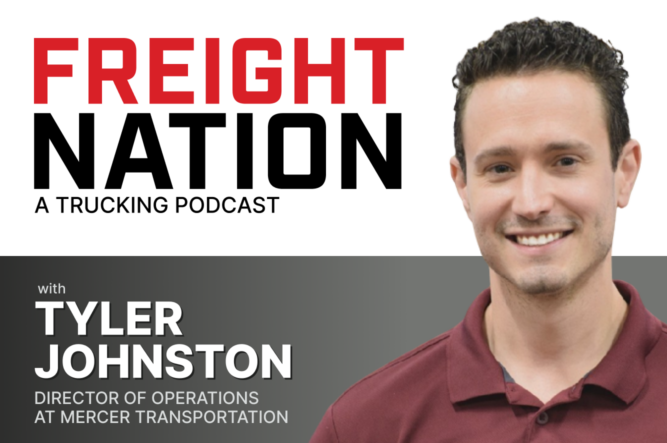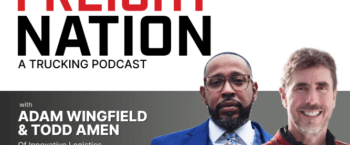Podcast: Navigating Carrier-Broker Relationships with Tyler Johnston

Listen up!
Check out our podcast, Freight Nation, where industry experts talk all things trucking.
In this episode of Freight Nation: A Trucking Podcast, host Brent Hutto is joined by Tyler Johnston, Director of Operations at Mercer Transportation. In Tyler’s experience, transparency is the best way to create trust and improve profits and longevity for both carriers and brokers.
Operating Under a Driver-Centric Model
Mercer Transportation was founded in 1977 as a water and sewage pipe hauler in North and South Dakota. Initially an owner-operator company, they now operate as an agent-based organization spread across the entirety of the USA. While the growth is admirable and speaks for itself, Mercer is not driven by numbers.
“We’re a people company. The numbers are big, but I always say we don’t care as much about the numbers as we do about people. Our job is to invest in individuals and help their businesses be successful, and we think if we do that the right way, the numbers will take care of themselves.”
Tyler Johnston, Director of Operations at Mercer Transportation
From their foundations, Mercer has been aiming to be the safest, fastest paying, truly driver-centric company in the USA. For Tyler, this means that every conversation in his operations team is centered around making the drivers more successful. His mantra truly is that if the drivers are successful, the company will be too: “Every single discussion that I have with my operations team has to be centered around what’s gonna make the driver more successful. Because if it’s centered around that, if they’re more successful, then we, in turn, are more successful. So all our culture from the very beginning has been what makes the contractor and the driver more successful?”
Navigating Negotiations
Negotiations between carriers and brokers are an intricate process. For both sides, the stakes are high, and how it is approached can drastically change the results. Tyler advises against approaching the conversation in a transactional way, deeming this to always be incorrect.
According to Tyler, if you only ever discuss one load at any one time, both sides will miss out on a lot of the wider information and context that could guarantee repeat business. For example, if you’re 100 miles away from a load and need extra money to haul it, withholding that information can make you seem unwilling to negotiate. If, instead, you explain the situation, you will build up a better relationship.
According to Tyler, the faster you build that relationship, the more repeat business you will get, and the more time you save in the long run. Getting everything onto the table sooner will get you to a solution faster:
“The more that I trust you, the more that I know about your situation and the solution that you may provide and that we can get to a solution quicker that I can bring to the customer, the more valuable you are to me, and we need to get to that as quick as we can.”
How Carriers Get Freight
To understand the intricacies of negotiations fully, it is important to appreciate the ways in which customers can send carriers freight. According to Tyler, no matter who you are, there are only three ways this process is carried out:
First is contract freight. This involves big companies, like Pepsi and Walmart. Each year they send giant spreadsheets detailing their plans for the next year to people like Tyler, and they all bid for the contracts they want. Then, the corporation awards the freight to the carriers.
The second is spot market freight, or Rolodex freight, as Tyler calls it. This is when a shipper refers to their Rolodex of every broker and asset-based carrier that has contacted them, and emails them their purchase order. A bidding war then ensues between everyone simultaneously.
The third and final way is, “He’s a good guy” freight. Tyler explains this as when a broker has been dealing with one company for many years, always providing them with good business. They can then, essentially, give a good reference for them to carriers, saying, “Yeah, I know John. He’s a good guy,” so carriers are more likely to accept the load.
By knowing the in-depth details of how freight is obtained, carriers and brokers can better navigate and understand their negotiations. After all, transparency in the process is key to building the relationship for success.
For more insights on building strong broker-carrier relationships, tune into this episode of Freight Nation: A Trucking Podcast on Apple, Spotify, or your favorite podcast platform.

Find out how our platform gives you the visibility you need to get more done.
Get helpful content delivered to your inbox.
Schedule a demo.
Find out how our platform gives you the visibility you need to get more done.





